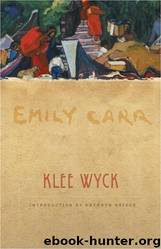Klee Wyck by Emily Carr; Kathryn Bridge

Author:Emily Carr; Kathryn Bridge
Language: eng
Format: mobi
Tags: Canada, Native American Studies, Women, British Columbia, Art, Social Science, Indians of North America, Canadian, Native Americans, Indians of North America - British Columbia - Social life and customs, General, Painters, Biography & Autobiography, Personal Memoirs, Indians of North America British Columbia, Ethnic Studies, Social life and customs, Painters Canada Biography, Native American, History
ISBN: 9781553650256
Publisher: Douglas & McIntyre
Published: 2004-04-15T03:15:59+00:00
SLEEP
When I was a child I was staying at one of Victoria’s beaches.
I was down on the point watching a school of porpoises at play off Trial Island when a canoe came round the headland. She was steering straight for our beach.
The Government allowed the Indians to use the beaches when they were travelling, so they made camp and slept wherever the night happened to fall.
In the canoe were a man and woman, half a dozen children, a dog, a cat and a coop of fowls, besides all the Indians’ things. She was a West Coast canoe—dug out of a great red cedar tree. She was long and slim, with a high prow shaped like a wolf’s head. She was painted black with a line of blue running round the top of the inside. Her stern went straight down into the water. The Indian mother sat in the stern and steered the canoe with a paddle.
When the canoe was near the shore, the man and the woman drove their paddles strong and hard, and the canoe shot high up on to the pebbles with a growling sound. The barefoot children swarmed over her side and waded ashore.
The man and the woman got out and dragged the canoe high on to the beach. There was a baby tucked into the woman’s shawl; the shawl bound the child close to her body. She waddled slowly across the beach, her bare feet settling in the sand with every step, her fleshy body squared down on to her feet. All the movements of the man and the woman were slow and steady; their springless feet padded flatly; their backs and shoulders were straight. The few words they said to each other were guttural and low-pitched.
The Indian children did not race up and down the beach, astonished at strange new things, as we always were. These children belonged to the beach, and were as much a part of it as the drift-logs and the stones.
The man gathered a handful of sticks and lit a fire. They took a big iron pot and their food out of the canoe, and set them by the fire. The woman sat among the things with her baby—she managed the shawl and the baby so that she had her arms free, and her hands moved among the kettles and food.
The man and a boy, about as big as I was, came up the path on the bank with tin pails. When they saw me, the boy hung back and stared. The man grinned and pointed to our well. He had coarse hair hanging to his shoulders; it was unbrushed and his head was bound with a red band. He had wrinkles everywhere, face, hands and clothing. His coat and pants were in tatters. He was brown and dirty all over, but his face was gentle and kind.
Soon I heard the pad-pad of their naked feet on the clay of the path. The water from the boy’s pail slopped in the dust while he stared back at me.
Download
This site does not store any files on its server. We only index and link to content provided by other sites. Please contact the content providers to delete copyright contents if any and email us, we'll remove relevant links or contents immediately.
We're Going to Need More Wine by Gabrielle Union(18631)
Pimp by Iceberg Slim(13777)
Bombshells: Glamour Girls of a Lifetime by Sullivan Steve(13683)
The Radium Girls by Kate Moore(11621)
Becoming by Michelle Obama(9755)
Educated by Tara Westover(7689)
The Girl Without a Voice by Casey Watson(7602)
Wiseguy by Nicholas Pileggi(5315)
The Wind in My Hair by Masih Alinejad(4839)
Hitman by Howie Carr(4825)
On the Front Line with the Women Who Fight Back by Stacey Dooley(4695)
Hunger by Roxane Gay(4677)
Year of Yes by Shonda Rhimes(4558)
The Rules Do Not Apply by Ariel Levy(4523)
The Borden Murders by Sarah Miller(4013)
Papillon (English) by Henri Charrière(3903)
Joan of Arc by Mary Gordon(3782)
Patti Smith by Just Kids(3601)
Mummy Knew by Lisa James(3520)
